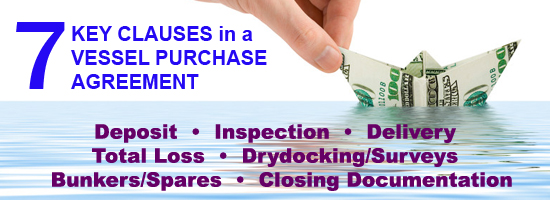Seven Key Clauses in a Vessel Purchase Agreement
 Vessel sales are a constant in the marine industry, even during downturns in the market. In fact, some see adverse market conditions as an opportunity to find bargains on vessels and other marine equipment. Once the buyer has “kicked the tires” on a vessel and the parties have agreed on a price, there usually is great pressure from all sides to quickly sign a purchase and sale agreement and close the deal. However, signing an agreement that fails to or inadequately addresses a key issue can cause problems down the road.
Vessel sales are a constant in the marine industry, even during downturns in the market. In fact, some see adverse market conditions as an opportunity to find bargains on vessels and other marine equipment. Once the buyer has “kicked the tires” on a vessel and the parties have agreed on a price, there usually is great pressure from all sides to quickly sign a purchase and sale agreement and close the deal. However, signing an agreement that fails to or inadequately addresses a key issue can cause problems down the road.
Based on years of negotiating, drafting and reviewing vessel purchase and sale agreements for vessels large and small, here is a checklist of the key business and legal points that should normally be addressed in a vessel purchase agreement:
- Deposit – If there is to be a deposit, the parties should specify how much it will be and the condition under which it will be deemed forfeited.
- Inspection – These clauses vary widely depending on the circumstances. If the buyer has already inspected and is satisfied with the condition of the vessel, the contract may simply provide that the sale is outright and definite upon execution with no right of inspection. Usually, and especially with larger and/or classed vessels with specialized equipment, the buyer will want the right to inspect the vessel and its class records and have the ability to get out of the contract and receive back the deposit, or receive an adjustment in price, if dissatisfied with the condition of the vessel. If there is to be an inspection, the contract normally specifies the scope of the inspection and provides a strict timeline to accomplish it, and may also spell out the consequences for delaying or impeding inspection, insurance and indemnity for claims of inspectors, and allocation of inspection costs.
- Time and Place of Delivery – These clauses may include consequences, such as a right of cancellation and/or liability for damages, for failure to timely deliver the vessel.
- Total Loss Before Sale – These provisions normally give the buyer the right to cancel if the vessel becomes a total loss before delivery.
- Drydocking or Underwater Survey – Similar to inspection provisions, these clauses should address the circumstances under which the buyer may require drydocking or divers’ inspection and who pays for these inspections, which may depend on what is found during the inspection, and insurance and indemnity for claims arising during drydocking. These provisions may also address the buyer’s right to have the tail shaft or other vessel components surveyed during drydocking.
- Bunkers, Spares – These clauses typically address how and when bunkers are quantified and priced and paid for, delivery of spares and other items of vessel equipment and whether these are included in the price or paid for separately.
- Closing Documentation – The key issue on this point is that the buyer will want to ensure that the seller’s deliverables include all certificates and other documents necessary to meet the requirements of the registry the buyer plans to use. The contract should provide for these to be delivered as a condition of payment of the purchase price, so the buyer does not have to chase the seller after closing for a piece of paper needed to complete registration of the vessel in the buyer’s name.
Vessel purchase and sale agreements usually also have other customary provisions, such as those addressing:
- Seller’s obligation to deliver the vessel free from all charters, encumbrances, mortgages and liens.
- Seller’s indemnification for claims incurred prior to delivery that are asserted after delivery.
- Allocation of responsibility for taxes, fees and expenses.
- The required condition of the vessel and equipment upon delivery.
- Default by the buyer or seller and the consequences of default.
- Dispute resolution.
Numerous forms of vessel purchase and sale agreements are available publicly to use as templates in drafting agreements and specific clauses. However, when presented with any contract, whether based on an established template (e.g. BIMCO, Saleform) or drafted for the particular deal, you should never hesitate to negotiate what is important to you and revise the agreement accordingly.
Bob Stefani practices in the areas of marine finance and other financial, corporate transactions and maritime and commercial litigation and government regulation.
